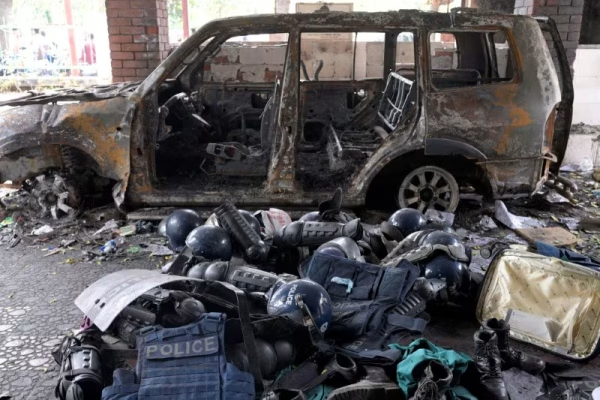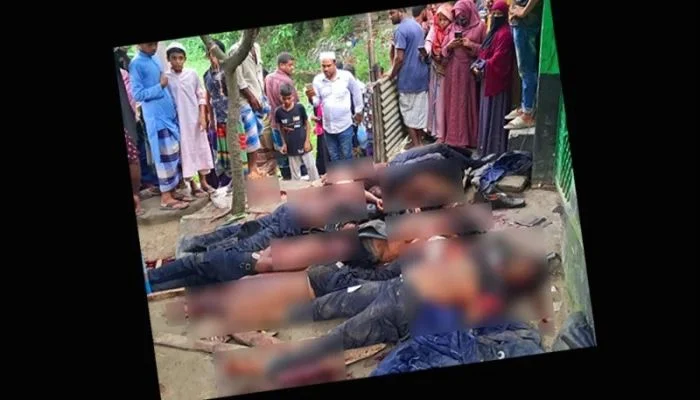Persistent violence against law enforcement and the judiciary by a specific group of people in Bangladesh is considered a grave crime, as it implies a concerted attack on the state machinery to change the system.
The murder of police members and judges began after independence at the hands of the ultra-left National Socialist Party (Jasod) and Purbo Banglar Sorbohara Party as they differed from the post-independence government regarding the country’s political philosophy.
Hence, the Awami League government led by Sheikh Mujibur Rahman, the paramilitary Rakkhi Bahini and its party supporters took these left parties as their enemies, while the anti-liberation forces like Jamaat-e-Islami and Muslim League were hiding or leaving Bangladesh after the surrender of the Pakistani Army together with its collaborators and a ban on religion-based politics. Due to the growing strength of these leftists and Islamists, backed by the US, Pakistan and China, Mujib and his Rakkhi Bahini were on alert 24/7, but they couldn’t prevent the August 15 massacre in 1975 due to the US- and Pakistan-backed elements in the small army.
The assassination of the president and the fall of the Awami League government gave rise to the radical Islamists while Jasod was cornered over power-sharing after the November 7 coup. General Ziaur Rahman arrested his rival, retired Colonel Abu Taher, and hanged him after a kangaroo trial. During his four-year-long martial law regime before holding the elections in 1979, Gen Zia ruthlessly countered numerous coup attempts by executing hundreds of army officers and ultra-left elements. He, however, rehabilitated the anti-Awami League coup actors and the 1971 war collaborators, lifted the ban on religion-based politics, and abolished secularism from the Constitution to steer the country towards state-sponsored Islamization in line with Pakistan.
There occurred no fatal attacks on law enforcement also during the military rule of General HM Ershad, who captured power after the assassination of his boss, Gen Zia. Gen Ershad revived Islamists and the anti-Awami League elements when he introduced the State Religion provision and facilitated the radical Islamists to join the wars in Palestine and Afghanistan.
When the country entered into a democratic system after the fall of Ershad, it was the Islamists who were enraged and publicly formed armed groups like the Harkatul Jihad al Islami Bangladesh (HuJI-BI), which is an offshoot of a Pakistan-based militant organization, even though Gen Zia’s party, the BNP, was in power at that time. The formation of HuJI-B by the Afghan mujahids also coincided with the return of Jamaat in the political sphere. They all challenged the democratic system and demanded Shariah law, though there was a State Religion in the Constitution and no sign of secularist views. The pro-Pakistani BNP government was ruthless against the activists promoting secularism and the trial of collaborators for war crimes.
After the BNP failed to regain power in two elections held in 1996, the Awami League formed a government for the first time in 21 years. At that time, the armed jihadists and Jamaat became very active and started attacking the law enforcement, judiciary and secularists.

They became more powerful when the BNP returned to power with the help of Jamaat in 2001 and orchestrated grave crimes against the Awami League, minorities and secularists. The pro-Jamaat Jama’atul Mujahideen Bangladesh (JMB) carried out hundreds of small-scale attacks on police, judges, and members of the Awami League and minority communities. The HuJI-B launched dozens of grenade attacks on the same targets while enjoying protection from the state machinery, which lasted also during the civil society-led government in 2007-08.
The highest number of police members was killed by the jihadists as well as the BNP-Jamaat alliance members during the Awami League’s 2009-24 period, especially in the July-August movement.
The first phase of attacks began in 2009, two years after the hanging of top JMB leaders, and then after the Awami League started arresting Jamaat leaders for the war crimes trials. The attacks on the police rose high in 2013, after the verdicts in the war crimes cases.
Soon after, the al-Qaeda affiliate group named Ansar al-Islam started killing secularist writers and publishers, and in 2015, more groups started emerging in affiliation with the Middle East-based Islamic State. Their main targets were the police, and non-Muslims and non-Sunni people. This prompted the government to take stern action against the Islamic State followers across the country.
Another spell of attacks on the police was seen during the anti-government demonstrations in 2023 to foil the scheduled elections. On October 28, a police member was lynched in the Fakirerpool area of Dhaka in broad daylight by the BNP-Jamaat activists.
The students participating in the anti-quota movement in July 2024 also targeted the police for obstructing their demonstrations till July 11 and firing upon the protesters on July 16. Two days later, at least three police members were lynched and hung from an overbridge in Jatrabari, prompting the government to take strict measures.
Scores of protesters and ordinary people were killed in clashes, lynchings and shootings by both sides in the following days. Because of the government’s tough actions, the Islamists disguised as student protesters targeted police stations and killed dozens of them in Dhaka, Sirajganj and elsewhere till August 5, with the army looking the other way because of its involvement in the coup, dubbed the student-led uprising.
The exact number of police members killed in the July-August anarchy hasn’t been known, but the Yunus administration puts the number at 44, with the former government alleging that over 3,000 police personnel were killed and their bodies burned or dismembered.
In the following months, some student coordinators, including Hasib Al Islam, Sirajganj BNP leaders, and the Khelafat Majlish leaders of Pabna admitted to having killed police members in a planned way to breaking the morale of the force and winning their fight against the Awami League government.


Leave a Reply
You must be logged in to post a comment.